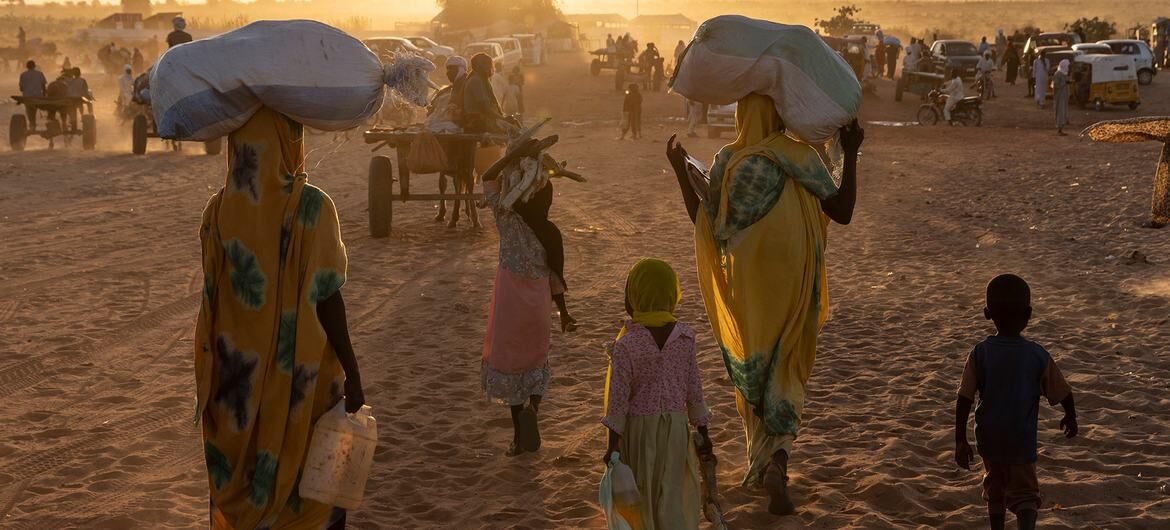El Fasher Under Siege: 500 Days of Starvation, Disease, and Violence Against Children

By Minna Adlan / GICJ
The city of El Fasher, capital of North Darfur, has now endured over 500 days under siege making it the devastating epicentre of human rights violations and suffering. According to UNICEF, around 260,000 civilians remain trapped in the city and its surrounding displacement camps, with children concerningly making up half of those at risk. For more than 16 months, the Rapid Support Forces (RSF) have continued to impose a blockade, hindering supply lines and systematically denying essential humanitarian relief that civilians are in dire need of. The siege has left El Fasher isolated, vulnerable, and collapsing under the weight and burden of starvation, disease, as well as deliberate violence and violations. The siege has been the longest and deadliest of the conflict.
The humanitarian toll on children has reached alarming catastrophic levels. UNICEF estimates that around 6,000 children suffer from Severe Acute Malnutrition (SAM) and are currently left with no treatment or relief. The blockage of aid convoys and depletion of medical supplies means lifesaving urgent therapeutic food and medicine cannot reach those in need, left vulnerable under perilous conditions. In just one week, 63 civilians, mostly women and children, died of malnutrition. UNICEF Executive Director Catherine Russell emphasizes: “We are witnessing a devastating tragedy – children in El Fasher are starving while UNICEF’s lifesaving nutrition services are being blocked.”
The siege has also included repeated attacks on civilians and civilian infrastructure with 7 children killed during an assault on the Abu Shouk displacement camp, just outside of El Fasher reported during the week of August 26th, 2025. Since the beginning of the blockade back in May 2024, the UN has verified over 1,100 grave violations against children which included:
- The killing and maiming of more than 1,000 children.
- At least 23 cases of rape, gang rape, and sexual abuse.
- Instances of abduction, forced recruitment, and exploitation by armed groups.
Hospitals and schools that are protected under International Humanitarian Law have been deliberately targeted and attacked. At least 35 hospitals and 6 schools have been struck, leaving already vulnerable civilians without critical access to healthcare and education.
The unmistakable weaponisation of humanitarian relief remains a primary issue where the RSF has obstructed aid convoys, looted supplies, and cut off access routes. Alongside such conditions, Sudan is currently facing its worst cholera outbreak in decades with over 2,400 deaths reported since July 2024. Children have become more weakened by hunger and are now particularly susceptible to other waterborne diseases in the overcrowded camps of Tawila, Zamzam, and El Fasher. This deliberate deprivation of food, medicine, and safe water is not only a humanitarian catastrophe but also constitutes grave breaches of international humanitarian and human rights law, and in some circumstances, amounts to crime against humanity.
The ongoing siege of El Fasher showcases the violations against the state’s obligations laid in the Geneva Conventions and the Convention on the Rights of the Child which guarantees the protection of civilians, particularly children, and prohibits the denial of humanitarian aid. Blocking humanitarian assistance is a violation of international law which highlights the moral and legal duty of the international community to respond.
Geneva International Centre for Justice (GICJ) strongly condemns the siege of El Fasher and the systematic targeting of children, families, and civilian infrastructure. GICJ calls for:
- The immediate lift of the siege of El Fasher and allow access to humanitarian aid.
- All parties to respect their obligations under international law and to end the attacks against civilians.
- The international community to fully enforce existing arms embargoes and support independent accountability mechanisms.
- Humanitarian actors and donor states to increase efforts to deliver life-saving aid.
The siege in El Fasher is a stark reminder that children and innocent civilians continue to pay the price for the conflict, and without urgent action, thousands of lives are on the line. Peace without accountability is impossible. The world must act now to end the siege of El Fasher and ensure justice for the victims.









